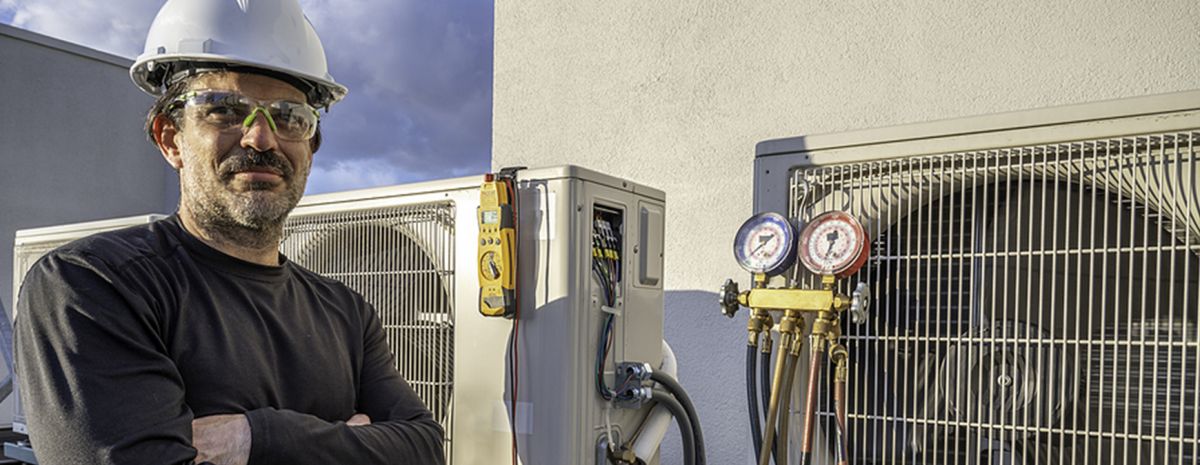TWS is a Great Training Option for Everyone
Learn more about how we can prepare you to advance your career.
HVAC technicians are responsible for installing, maintaining, and repairing heating and cooling systems. They can work in residential, commercial, or industrial settings depending on their specific role.
Like all skilled trades professionals, HVAC techs use highly specialized tools to perform their duties.
If you’re just getting started in the industry, it’s important to become familiar with these essential tools so you have what you need to succeed.
What kind of tools do HVAC technicians use?
1. Reciprocating Saw
Heating and cooling units are commonly located in cramped and confined areas such as garages, attics, and closets. A Sawzall can help HVAC techs cut through barriers such as wood, sheet metal, drywall, and pipes for quick and easy access to HVAC systems that need attention. This can make for more efficient and smoother home service calls overall.
Have You Considered a Career in the Skilled Trades?
Fill out the form to recieve a no obligation info packet.
2. Thermometer
HVAC is all about achieving the right temperature. As a result, digital thermometers are an essential tool for HVAC professionals. These dynamic, compact, and capable gadgets can provide accurate temperature readings of a room to give HVAC technicians an idea of how a system is performing. Since there are so many different kinds of thermometers available, it’s common for HVAC techs to invest in a handful for different uses. Good thermometers are portable, accurate, and durable while still meeting state regulations.
3. Multimeter
HVAC professionals regularly work with electrical components required to run heating and cooling systems. A multimeter is capable of detecting an electrical charge and measuring voltage, making it a handy tool for techs to have on hand. It keeps HVAC techs safe while providing necessary information for installation, repair, and maintenance work. A good multimeter can read AC and DC voltage and take various measurements including amperage, continuity, and capacitance.
4. Refrigerant Recovery Machine
Refrigerant plays a fundamental role in HVAC systems due to its ability to transfer heat quickly and energy-efficiently. However, this chemical compound comes with a number of potential hazards since it’s toxic and flammable when handled incorrectly. Since 1995, HVAC techs have been required to use a specialized refrigerant recovery machine to dispose of this fluid in a safe and eco-friendly manner. These specialized machines are designed to remove refrigerants in compliance with standards set by the Environmental Protection Agency (EPA) whether HVAC techs are repairing, maintaining, or removing HVAC or refrigeration systems. A refrigerant recovery machine collects refrigerant in its tank to get reused, recycled, or disposed of properly.
5. Manifold & Refrigerant Gauges
HVAC professionals deal with a lot of moving parts on the job which makes accurate gauges an essential tool of the trade. Manifold gauges make it easier to determine if a line has a leak that could be causing larger problems. These gauges can also make it easier to remove refrigerant safely from AC systems. On the other hand, refrigerant gauges are designed to detect the refrigerant levels of an HVAC system. Don’t forget to get your hands on some accompanying hoses so you can use these handy tools.
6. Thermal Image Device
The average homeowner or business owner doesn’t understand the ins and outs of HVAC systems. As a result, technicians typically don’t have much to work with when diagnosing a heating or cooling issue. A thermal imaging device can greatly cut down on the troubleshooting process by highlighting temperature abnormalities. This quick detection allows HVAC professionals to get to the root of the problem quickly and efficiently.

New: Industrial Maintenance
Learn About Our New Advanced Industrial Maintenance Program in Houston
Tulsa Welding School is proud to announce our newest program offering available at our Houston Campus – Advanced Industrial Maintenance Technology! Learn the skills you need to take on the industries of manufacturing, distribution, energy production and facility maintenance in as few as 7 months.
Further Reading: 4 Reasons to Consider a Skilled Trades Career
Do HVAC Techs buy their own tools?
It depends on where you’re employed. Some businesses expect HVAC professionals to supply their own equipment. Other companies provide more specialized equipment needed to tackle large projects. At the beginning of your career, it’s a good idea to invest in the basic equipment and tools you’ll be using on the vast majority of service calls. Keep your receipts and document any issues since many HVAC employers cover damage that occurs when you’re working.
How much do HVAC tools cost?
It’s tough to say exactly how much an HVAC professional can expect to spend on equipment since there are so many variables. The fluctuating price of equipment, the location of purchase, the type of equipment, and other factors can lead to different costs overall. This cost is spread out over time as HVAC professionals tend to accumulate equipment throughout their education, training, and early years on the job.
Want to Learn More?
Because HVAC is a hands-on job, technical training is typically required for anyone to enter this field. Many people decide to invest in a trade program to learn the trade skills they need to be safe and effective as a professional. To learn more about our HVAC program offered at the Tulsa, OK, Houston, TX and Jacksonville, FL campuses contact us at Tulsa Welding School, call 1-855-806-4921.
This blog has been labeled as archived as it may no longer contain the most up-to-date data. For a list of all current blog posts, please visit our blog homepage at https://www.tws.edu/blog/







